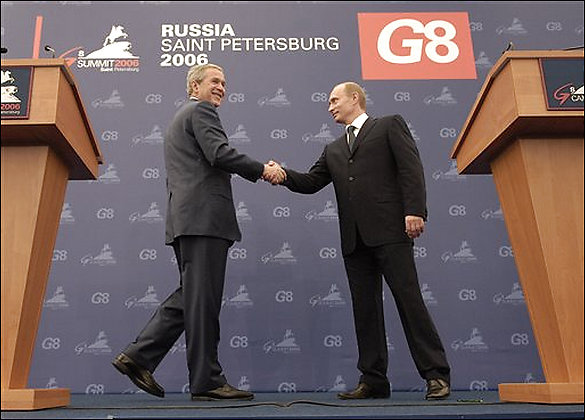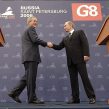
BUSH DOWNPLAYS “SOVEREIGN DEMOCRACY” AT PUTIN’S BARBECUE
Publication: Eurasia Daily Monitor Volume: 3 Issue: 137
By:

The two-session summit between U.S. President George W. Bush and Russian President Vladimir Putin – dinner on Friday and working meeting on Saturday morning – was perhaps the most important part of the much-anticipated G-8 gathering at the Strelna complex outside St. Petersburg, July 15-17. The agenda for the grand event where each of the eight leaders had a chance to push his or her favorite topic was certainly quite dense: From the over-debated energy security issue to traditional pledges for more aid to Africa and the quite untraditional struggle against government corruption. The latter issue was included on U.S. initiative with some quite transparent references to the ongoing bureaucratic plunder of Russia (Kommersant, July 14). And the six other members of the elite club delegated to the United States the dubious privilege of raising the sensitive question the host country’s non-compliance with the democratic rules of the organization.
Russia’s retreat from democracy has become a well-established trend and, despite Putin’s best efforts to turn in a decent performance in the role of G-8 chairman, in the last half-year it has progressed yet further. The amendments to the “Law on Countering Extremist Activities” approved by the State Duma just a week prior to the Strelna summit provided perfect legitimacy to the pre-summit wave of detentions and arrests of dozens of potential “trouble-makers” (Nezavisimaya gazeta, July 14). Very direct pressure was applied in order to disrupt the NGO conference on “Another Russia” last week, but the opposition groups still managed to prove that the prevailing political passivity in Russia does not equal broad support for Putinism (Ezhednevny zhurnal, July 14). President Bush examined this trend with utmost attention, inviting a group of leading U.S. experts on Russia to the White House and meeting with 16 carefully selected young representatives of Russian NGOs right before his dinner with Putin (Vedomosti, July 14).
It was exactly at that dinner that the most difficult and delicate matters pertaining to the character of the faltering U.S.-Russian partnership should have been addressed. Putin opted for a casual outdoor barbecue, emphasizing the informality of the family evening. From the first back-slapping to the flowers presented to Laura Bush it was clear that his tone was very different from the harsh rebuffs of the uncomfortable questions by Western journalists the day prior (Ekho Moskvy, July 14). According to Bush, the relaxed atmosphere was very conductive for discussing the “philosophy of government and governing,” but Putin was well prepared for such quasi-philosophic disputes and elaborated on Russia’s unique history. It is not entirely clear how the peculiarities of land reform came into these generalizations, but Bush emerged with the impression that there was nothing wrong with “Russian-style democracy.” Bush even assured Open Russia’s Irina Yasina, who raised the issue of jailed Yukos tycoon Mikhail Khodorkovsky, that there was no such thing as “sovereign democracy” (Kommersant, July 15).
With the spirit of friendly cooperation restored, the two leaders took on a broad range of issues at the Saturday meeting and tried to impress upon journalists at the joint press conference that they had achieved much progress. On a closer examination, however, hardly any sign of practical results can be discovered. The disagreements over Russia’s entry into the WTO were left to the negotiators to resolve; the worries about the North Korean missile tests produced no common agenda for action; the smoldering conflicts in Georgia were barely touched upon; the urgent exchange of views on the Middle East crisis spiraling out of control established no common ground, with Bush putting the blame squarely on Hezbollah and Hamas and Putin calling for mutual restraint. There were some agreements on advancing projects related to nuclear energy, but Putin sought to launch a new round of high-prestige strategic arms control negotiations – and Bush would have none of that. Iran was foremost on his mind – but Putin refused to discuss sanctions and reiterated his objections against “holy alliances.” Bush’s cheerful appearance at the press conference was balanced by the dour expression of Secretary of State Condoleezza Rice.
Putin, sporting a dark tie with a dark suit, appeared focused and even tense, as if trying to show that he did not give an inch of political ground to his opponent, while upholding his “sovereign” non-cooperativeness. Bush’s equivocal answer to the last question invited his acid joke that nobody in Russia would want to have “the same kind democracy as they have in Iraq,” but he had grace to thank his counterpart for the non-biased, objective, and friendly manner of discussions. It was probably a good tactic to avoid putting Putin on the defensive, but Bush may regret the missed opportunity at that barbecue.
While Putin above all tries to convey the impression that he is indeed “a strong man,” he is also a confused man without a plan. There are no foreign policy drafts for the post-G-8 summit period where no more grand occasions are expected – and the need to behave is therefore far smaller (Ezhednevny zhurnal, July 12). There is no solution for the daunting problem of transferring power in 2008, and Putin’s courtiers have engaged in desperate intrigues, with one clan forcing him to sack the prosecutor general and another to reappoint him as the minister of justice (Gazeta.ru, June 22). Five years ago, Bush made a personal wager on Putin, describing him as “an honest, straightforward man” and suggesting, “His leadership will serve Russia well.” In Strelna, he was reluctant to admit that this stake was lost and that Putin’s over-centralized and thoroughly corrupt regime had done great disservice to the country. It would have certainly been senseless to explain to Putin “how to run his government” – but it could have been useful to tell him plain and clear how not to run his country and how not to find himself among disgraced losers like Serbia’s Slobodan Milosevic or Alexander Lukashenka of Belarus or, indeed, Alexander Kerensky of the doomed Provisional Government.




